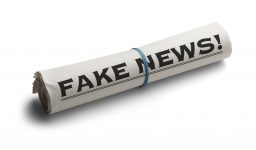Should Publishing ‘Fake News’ be a Crime?

The Australian Constitution explicitly guarantees just five rights:
- The right to vote (Section 41),
- Protection against acquisition of property on unjust terms (Section 51 (xxxi)),
- The right to a trial by jury for criminal cases in the higher courts (Section 80),
- Freedom of religion (Section 116), and
- The right against discrimination on the basis of State of residency (Section 117).
In addition to these, the High Court has found an implied freedom of political communication, which is essential for the operation of our system of representative government as created by sections 7, 24, 64 and 128.
The test of whether a law which may affect this freedom is nevertheless permissible is crystallised in the case of Lange v ABC (1997):
- Does the law actually burden freedom of political communication? and if so:
- Is the law “reasonably appropriate and adapted to serve a legitimate end” that supports a system with representative government?
‘Fake News’
The political campaign of Donald Trump brought the term ‘fake news’ into the spotlight; so much so, that the phrase was named the 2016 ‘Word of the Year’ by the Macquarie Dictionary, primarily due to its influence on political discourse.
‘Fake news’ originally referred to internet articles that deliberately published misinformation to attract engagement, often using clickbait-style headlines.
However, it has developed to signify misleading reports and commentary about matters of political significance.
Mr Trump used the term throughout his campaign – and continues to use it to this day – to debunk and discredit news articles and journalists who are critical of his views.
The concern that such misinformation is being improperly used to influence political opinion has raised debate about whether such conduct should be sanctioned, or even criminalised.
Dangers of ‘fake news’
Winston Churchill once stated, “A lie gets halfway around the world before the truth has a chance to get its pants on.”
The power and influence of ‘fake news’ was demonstrated by false reports made just a week before the US election that presidential candidate Hillary Clinton was at the centre of a paedophilia ring.
That information went ‘viral’ on social media, with right-wing media outlets including talk show host Alex Jones fanning the flames by repeatedly claiming Mrs Clinton was involved in child abuse and that her campaign chairman, John Podesta, took part in satanic rituals.
A video which contained the accusation was published just four days before the election. It was viewed more than 400,000 times, and re-tweeted by ‘bots’ and by General Michael Flynn, Mr Trump’s national security adviser.
The story garnered more engagement and shares than reports on the presidential campaign by the CNN, the New York Times and the Washington Post.
While it is hard to gauge the impact of such allegations, many believe they were a contributing factor to the discrediting of Ms Clinton – along with constant accusations by Trump and his cohorts that the presidential candidate is a ‘criminal’.
Prohibition of ‘fake news’
The enormous power of ‘fake news’ has led some countries to criminalise the conduct.
Canadian law, for instance, prescribes the following offence:
‘Every-one who wilfully publishes a statement, tale or news that he knows is false and that causes or is likely to cause injury or mischief to a public interest is guilty of an indictable offence and liable to imprisonment for a term not exceeding two years.’
German chancellor Angela Merkel has foreshadowed the possibility of enacting a similar law in that country, identifying a need to “confront this phenomenon and if necessary, regulate it”.
Freedom of speech
The problem with criminalising political discourse is that it has the potential to dissuade individuals from expressing their opinions for fear of being prosecuted. Indeed, such prohibitions could be used by those in power to threaten commentators and silence dissent.
The UN Human Rights Committee is fundamentally against censoring political discourse of any sort, on the basis that it would “unduly limit the exercise of freedom of opinion and expression.”
Back in 2000, the UN Special Rapporteur made his views on the subject clear.
“In the case of offences such a … publishing or broadcasting “false” or “alarmist” information, prison terms are both reprehensible and out of proportion to the harm suffered by the victim”, he said.
“In all such cases, imprisonment as punishment for the peaceful expression of an opinion constitutes a serious violation of human rights.”
An offence in Australia?
The constitutional protection of freedom of political communication would invalidate legislation which prohibits the publication of ‘fake news’ unless the law was “reasonably appropriate and adapted to serve a legitimate end” and supports our system of representative government.
The argument that such a law would be valid might run along these lines: prohibiting the publication of knowingly false information that is capable of influencing political opinion serves the legitimate end of ensuring the public has truthful information and is not swayed by misinformation.
It should be borne in mind that any such law would require the prosecution to prove a number of elements in order to establish guilt; including that the information was false, that the publisher knew it was false and that the information is likely to “cause injury to the public interest” (as required by the Canadian law) or, perhaps, that it has the potential to sway public opinion on matters of political significance.
The argument against such a law might be that it is detrimental to the interests of representative government because it has the potential to censor and silence political communication, albeit knowingly false publications.
If such a law were enacted, some of the questions that might arise include: who would be targeted for prosecution? Would it work unfairly against those who cannot afford to pay experts for reports and court attendances to adduce evidence about what is ‘fake’ and what is not? And would it ultimately create just another means to suppress dissent?







